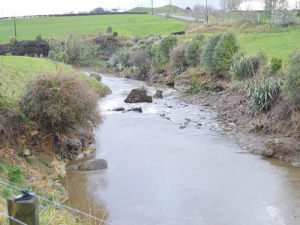With autumn now here it’s the time for in-stream works. We’re keen to lift awareness of the issues involved and the responsibilities of farmers and others when working in and around water bodies.
These works can include stream straightening and excavating the beds of rivers and lakes for a wide range of purposes, including to install bridges or culverts, remove a build-up of sediment or manage an unstable stream.
Sediment build-up or instability may be caused by stock trampling the banks, or cultivation of paddocks too close to waterways without an adequate buffer zone or enough sediment control measures.
Deal with these to avoid recurring problems; their effects on aquatic life and water quality can be exacerbated through inappropriate in-stream excavations or inappropriate removal of bank vegetation.
Besides hurting water quality and aquatic habitats by increasing sedimentation, destabilising banks and beds can change the course of rivers and streams, resulting in loss of land and property and infrastructure damage.
Structures such as bridges, culverts and water intakes are essential features of most farms, but they must be well planned and constructed to ensure they are not at risk from the stream, and to protect stream values. These structures can obstruct or divert flows, or obstruct fish passage up and down rivers, blocking access to spawning grounds and migration generally, including to traditional or recreational fisheries.
The Resource Management Act clearly prohibits any disturbances to river, stream and lake beds unless the disturbance is specifically allowed by a resource consent issued by a regional council.
That’s why our council policies cover the use, erection, reconstruction, placement, alteration, extension, removal or demolition of structures in, on, under or over the beds of rivers, streams and lakes and any disturbance of the bed as well, such as stream straightening or cleaning.
If you are planning such works, check the rules first.
However, Waikato Regional Council also recognises some activities in and around waterways are not harmful. The regional plan has many rules enabling ‘everyday’ activities, provided certain conditions are met to avoid the sorts of problems described above. Those rules identify what activities are permitted without consents, and the conditions those activities must meet.
All parties involved can be held responsible for unlawful in-stream works – property owners, managers, earthworks contractors, etc. So check the regional rules and seek good quality advice when planning any activity in or near a stream.
That will ensure our rivers and streams are cared for as complex, delicate ecosystems in a productive agricultural landscape.
We all know farming depends on good quality water for stock and, generally speaking, better water quality means healthier animals and higher productivity.
Managing the margins of waterways – the so-called riparian zones – helps protect water quality on farmers’ own properties and those of their downstream colleagues.
Waikato Regional Council is organising a field day on soil conservation and riparian management on April 4 at the Waitanguru Hall, RD1, Piopio. Farmers and landowners will benefit from hearing from the experts.
• Bala Tikkisetty is a sustainable agriculture advisor at Waikato Regional Council. For more information contact him on 0800 800 401.
















